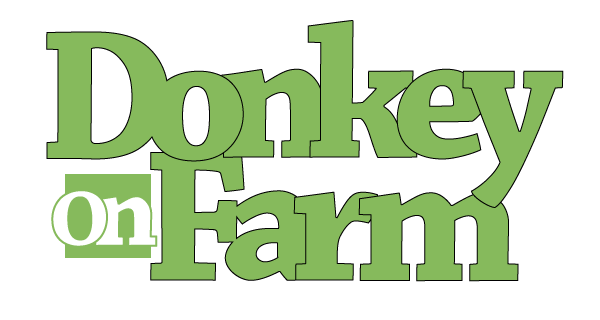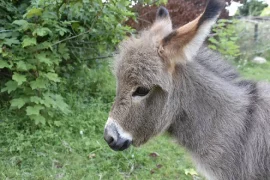Animal-assisted therapy has been proven to provide comfort, joy, and even therapeutic benefits to people dealing with various challenges. Traditionally, dogs, horses, and cats have taken center stage as therapy animals, offering companionship to those in need. However, a new contender has been gaining interest in this field: miniature donkeys. But can miniature donkeys be therapy animals? Let’s explore what makes them unique and how they might be the perfect addition to a therapeutic environment.
What Makes a Good Therapy Animal?
To understand whether miniature donkeys can be therapy animals, it helps to look at the characteristics that make an animal well-suited for therapy work. Effective therapy animals are generally gentle, social, and easy to handle. These traits are essential in settings like hospitals, schools, and nursing homes, where therapy animals interact with individuals of all ages, including those with physical or emotional sensitivities.
Therapy animals must be calm and approachable, helping people feel safe and relaxed around them. They should also be highly trainable, as they need to respond to handlers and adapt to diverse environments. Finally, a good therapy animal should have a strong connection to people, offering unconditional affection and comfort.
Characteristics of Miniature Donkeys
Miniature donkeys possess many of these ideal therapy qualities. Physically, their small size makes them easy to manage and less intimidating than larger animals. Standing about 30-36 inches tall, they’re an approachable option, especially for children and those who may be overwhelmed by larger animals. Their gentle eyes, soft fur, and long ears give them a lovable, cartoonish appearance that instantly puts people at ease.
Personality-wise, miniature donkeys are known for their calmness, loyalty, and innate friendliness. They’re naturally gentle animals that enjoy attention and social interaction, making them especially suited for therapy. Compared to other equines, they tend to be steady and less reactive, which is a significant advantage in therapy environments.
Additionally, miniature donkeys are relatively low-maintenance animals, known for their longevity and ease of care. These traits allow them to stay in therapy programs for years, forming long-lasting bonds with those they work with.
Benefits of Miniature Donkeys as Therapy Animals
So, can miniature donkeys be therapy animals? Absolutely. Here are some of the unique benefits they offer:
- Comfort and Companionship: Miniature donkeys are affectionate animals that can provide soothing comfort to individuals in need. Their presence has a calming effect, helping reduce stress, anxiety, and loneliness in therapeutic settings.
- Unique Appeal: Miniature donkeys offer a unique, novel experience as therapy animals. People are often delighted and surprised to see a donkey in a therapeutic environment, which can brighten their day and foster engagement.
- Practical Benefits: As larger animals, they offer a physical presence that’s comforting without being intimidating. This can be beneficial for those who may not be as soothed by smaller animals like dogs but are more at ease with a non-threatening, larger animal.
Success Stories of Miniature Donkey Therapy Programs
Several therapy programs have already seen success with miniature donkeys. For example, The Donkey Sanctuary in the UK has offered donkey-assisted therapy for children and adults with special needs. Many participants find these animals uniquely comforting, and the donkeys have become a cherished part of their care routines. Other programs in the United States have introduced miniature donkeys to schools and nursing homes, where they quickly win hearts and provide a sense of peace and happiness.
Stories from these programs illustrate that miniature donkeys can be a powerful source of comfort and joy, making them excellent candidates for therapy roles.
Challenges and Considerations
While miniature donkeys have much to offer, there are some considerations to keep in mind.
- Zoning and Space Requirements: Miniature donkeys require adequate space, both indoors and outdoors, which might limit their use in certain therapy settings. Not all facilities are zoned for livestock, so it’s important to confirm regulations before adding a donkey to a therapy program.
- Training and Acclimation: Like any therapy animal, miniature donkeys need proper training to handle various environments and interact safely with people. Though naturally gentle, they still need socialization to become comfortable with therapy work.
- Health and Care: Donkeys require regular grooming, healthcare, and hoof care, which needs to be factored into any therapy program. They thrive with regular exercise and outdoor time, so the logistics of caring for a miniature donkey must be considered.
How to Get Started with Miniature Donkey Therapy
For those intrigued by the idea of miniature donkey therapy, here are some steps to get started:
- Training and Socialization: Begin by socializing the donkey to human interaction and new environments. Specialized training programs for therapy animals are also available and can help prepare a miniature donkey for therapeutic work.
- Legal Requirements and Certifications: Check your area’s regulations on therapy animals. Some regions may require certifications or permits to bring a miniature donkey into certain facilities.
- Finding a Suitable Donkey: If you don’t already own a miniature donkey, work with a reputable breeder or adoption agency to find one with a suitable temperament for therapy. Look for donkeys that are calm, friendly, and comfortable around people.
Conclusion
Miniature donkeys can indeed be therapy animals, bringing a unique blend of comfort, curiosity, and novelty to therapeutic environments. With their gentle nature, small size, and affectionate personalities, miniature donkeys have the potential to be excellent therapy companions. Though they require some special care and preparation, their ability to connect with people in meaningful ways makes them a valuable addition to any animal-assisted therapy program.

![Can Miniature Donkeys Be Therapy Animals? [Hint: They’re Different] can-miniature-donkeys-be-therapy-animals](https://donkeyonfarm.com/wp-content/uploads/2024/10/can-miniature-donkeys-be-therapy-animals.jpg)

![How Much Are Miniature Donkeys [Plus Where to Buy Them?] how much are miniature donkeys](https://donkeyonfarm.com/wp-content/uploads/2023/09/Perry-miniature-donkey-in-Palo-Alto-CA-2016_11zon-270x180.jpg)

![What is a Miniature Donkey? [How Are They Different?] what is a miniature donkey](https://donkeyonfarm.com/wp-content/uploads/2022/05/What-is-a-miniature-donkey-270x180.jpg)
